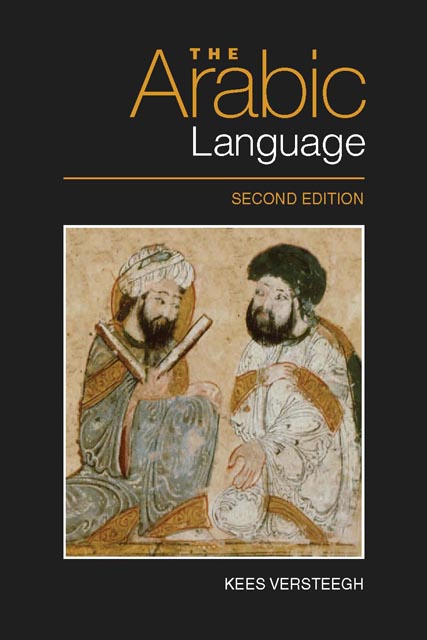Book contents
- Frontmatter
- Contents
- Preface to First Edition
- Preface to Second Edition
- List of Figures and Maps
- List of Tables
- Note on Transcription and Glossing
- 1 The Study of Arabic in the West
- 2 Arabic as a Semitic Language
- 3 The Earliest Stages of Arabic
- 4 Arabic in the Pre-Islamic Period
- 5 The Development of Classical Arabic
- 6 The Structure of Arabic
- 7 The Arabic Linguistic Tradition
- 8 The Emergence of New Arabic
- 9 Middle Arabic
- 10 The Study of the Arabic Dialects
- 11 The Dialects of Arabic
- 12 The Emergence of Modern Standard Arabic
- 13 Diglossia
- 14 Bilingualism
- 15 Arabic as a Minority Language
- 16 Arabic Pidgins and Creoles
- 17 Arabic as a World Language
- Bibliography
- List of Abbreviations
- Index
1 - The Study of Arabic in the West
Published online by Cambridge University Press: 18 November 2022
- Frontmatter
- Contents
- Preface to First Edition
- Preface to Second Edition
- List of Figures and Maps
- List of Tables
- Note on Transcription and Glossing
- 1 The Study of Arabic in the West
- 2 Arabic as a Semitic Language
- 3 The Earliest Stages of Arabic
- 4 Arabic in the Pre-Islamic Period
- 5 The Development of Classical Arabic
- 6 The Structure of Arabic
- 7 The Arabic Linguistic Tradition
- 8 The Emergence of New Arabic
- 9 Middle Arabic
- 10 The Study of the Arabic Dialects
- 11 The Dialects of Arabic
- 12 The Emergence of Modern Standard Arabic
- 13 Diglossia
- 14 Bilingualism
- 15 Arabic as a Minority Language
- 16 Arabic Pidgins and Creoles
- 17 Arabic as a World Language
- Bibliography
- List of Abbreviations
- Index
Summary
In 632 CE, the Prophet of Islam, Muḥammad, died in thecity of Medina. The century of conquests thatfollowed brought both the Islamic religion and theArabic language to the attention of a world that upuntil then had possessed only the vaguest notion ofwhat went on in the interior of the Arabianpeninsula. Ever since this first confrontationbetween the Islamic world and Europe, the Arabs andtheir language have been part of the Europeanexperience. At first, the intellectual relationshipbetween the two worlds was unilateral. Greekknowledge and knowledge about Greek filtered throughinto the Islamic world, while the Byzantines did notshow themselves to be overly interested in thingsArabic. Although their military prowess was feared,the Arabs’ culture and language were not deemedworthy of study. Their religion was regarded aslittle more than the latest in the series ofChristian heresies that flourished in the East. Forthe Byzantines, the Greek heritage did not need anycontribution from the inhabitants of a desert, whoseonly claim to fame rested on their ability to harassthe Byzantine armies and contest Byzantine hegemonyin the eastern Mediterranean.
In Western Europe, for a long time information aboutthe Arabs and their religion remained limited tovague notions about paganism in the desert ofArabia. After the conquest of the Iberian peninsulain 711, the Arabs’ presence came to be seen as adirect threat to Europe and Christianity. Yet therewas another side to this confrontation, becausethrough the Arabs Western Europe got in touch with apart of its heritage that it had lost in the turmoilof the fall of the Roman Empire. Western medicineand philosophy became dependent on the Arab cultureof Islamic Spain for knowledge of Greek medical andphilosophical writings, which were practicallyunknown in the West. From the eleventh centuryonwards, after the fall of Toledo in 1085, thesewritings began to circulate in Latin translations ofthe Arabic versions. The Arabic language itself wasnot widely studied, since most scholars relied upontranslations that were made by a small group oftranslators, often Jews, who had familiarisedthemselves with the language either in Arab Sicilyor in al-ʾAndalus.
In the twelfth century, during the period of theCrusades, Western Europeans became acquainted withIslamic culture and Arabic on site.
- Type
- Chapter
- Information
- The Arabic Language , pp. 1 - 9Publisher: Edinburgh University PressPrint publication year: 2014

